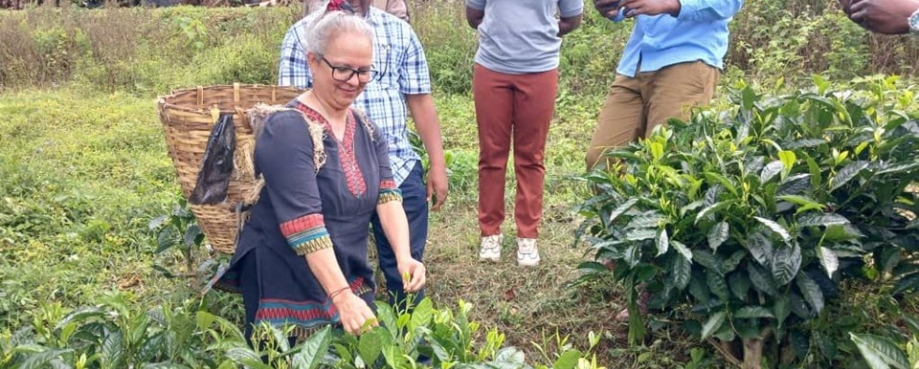
I’m thrilled to be beginning my role as ETI’s NGO coordinator. Here’s why.
There’s one thing that makes the Ethical Trading Initiative (ETI) stand out, that gives it its unique power and appeal. Many companies are making efforts – big and small – to make sure the workers producing their goods have decent pay and conditions. Many NGOs are helping companies in these efforts. And of course, trade unions are working hard all over the world to protect the rights of workers.
But only the ETI brings these three vital actors together into a safe space where they can support each other to undertake this hugely complex work.
There may be other contexts in which companies come together to address such issues at a sector-wide level, but only at ETI are those efforts supported by the power of the trade unions and the knowledge, reach and expertise of NGOS.
That’s why I’m so excited to be starting in my new role as NGO coordinator. I see this role as bringing to life what was intended in the ETI Charter: helping NGOs get the best out of their membership of ETI, fostering and supporting effective collaboration with other members and the ETI secretariat, and helping them in turn understand how to get the best out of ETI’s NGO members.
The power of three
In the five years that I worked in the ETI secretariat – from 2012 to 2017 - I learned how powerful the tripartite model can be.
I have witnessed it support young women working in South Indian garment factories to stand up for themselves and demand their rights.
I have seen it assist South African vineyard workers by increasing understanding among workers, supervisors, and managers of the value of treating each other with mutual respect.
How guidance created with the input of all ETI’s members on issues like living wages, working hours and responsible buying has stood the test of time and given companies the confidence and knowledge they need to deliver on the ILO Conventions.
Since then, I’ve founded an NGO of my own which is now itself a member of ETI. In this context I’ve been impressed with the breadth and depth of the knowledge and experience of ETI’s NGO members. Together we have been able to reach out to ETI’s company members to challenge and support them in addressing issues like sexual exploitation in the tea sector.
NGO expertise
Companies often struggle to reach the people who produce the goods they sell through the multiple complex tiers of international supply chains. But that is exactly were the work of many NGOs is focused. They have vast experience engaging with workers, farmers, and communities across every continent, in a huge range of agricultural and manufacturing industries that companies can draw on, either individually or in collectively, in working groups.
They also have vast experience in lobbying and advocacy, something that companies may not be equipped to do alone. NGOs know how to influence the policies of governments – and of companies themselves – to support them in protecting workers’ rights.
Whatever human rights issue a company may be facing in its supply chain, be it sexual exploitation, forced labour, child labour, low wages, or caste discrimination, ETI has an NGO that can help with it. And companies can also help NGOs working on those issues to get a deeper understanding of the commercial realities and challenges that they face in tackling those issues.
Oxfam, Christian Aid, and the Fairtrade Foundation were founder members of ETI in 1998, and NGOs continue to play a vital role, alongside their company and trade union counterparts, in the governance of ETI. We hold positions on the Board of Directors, are consulted on ETI’s strategy, inform decisions about whether or not to accept new company members, and we support the process of assessing company progression.
Driving progress
The world has changed hugely since ETI’s founding. Pivotal events like the collapse of the Rana Plaza garment factory in Bangladesh have sharpened the world’s focus on workers’ rights. The global COVID pandemic exposed the world’s inextricable interdependence – and its inequalities.
The framing of the UN’s Guiding Principles on Business and Human Rights have created a consensus on which countries and companies can base their human rights efforts, and new legislation in many countries is emerging to make companies’ responsibility for protecting the rights of workers in global supply chains mandatory.
There is now a plethora of organisations and consultancies working in this space where once there was only ETI. But there is still only one that combines the power of companies, trade unions and NGOs to deliver on a set of workers’ rights based on the ILO Conventions.
My job will be to ensure that NGOs can play their part meaningfully and to their full potential to help companies deliver on their responsibilities. I fully intend to help cultivate the linkages between NGOs, companies, and trade unions, ensuring an open dialogue based on mutual respect and a commitment to finding the most practical and meaningful solutions to the complex human rights issues we face.
Whether you’re a company, trade union or NGO member, please do reach out to me at NGOCoordinator@eti.co.uk. I’m looking forward to working with you to help make ethical trade a reality.
